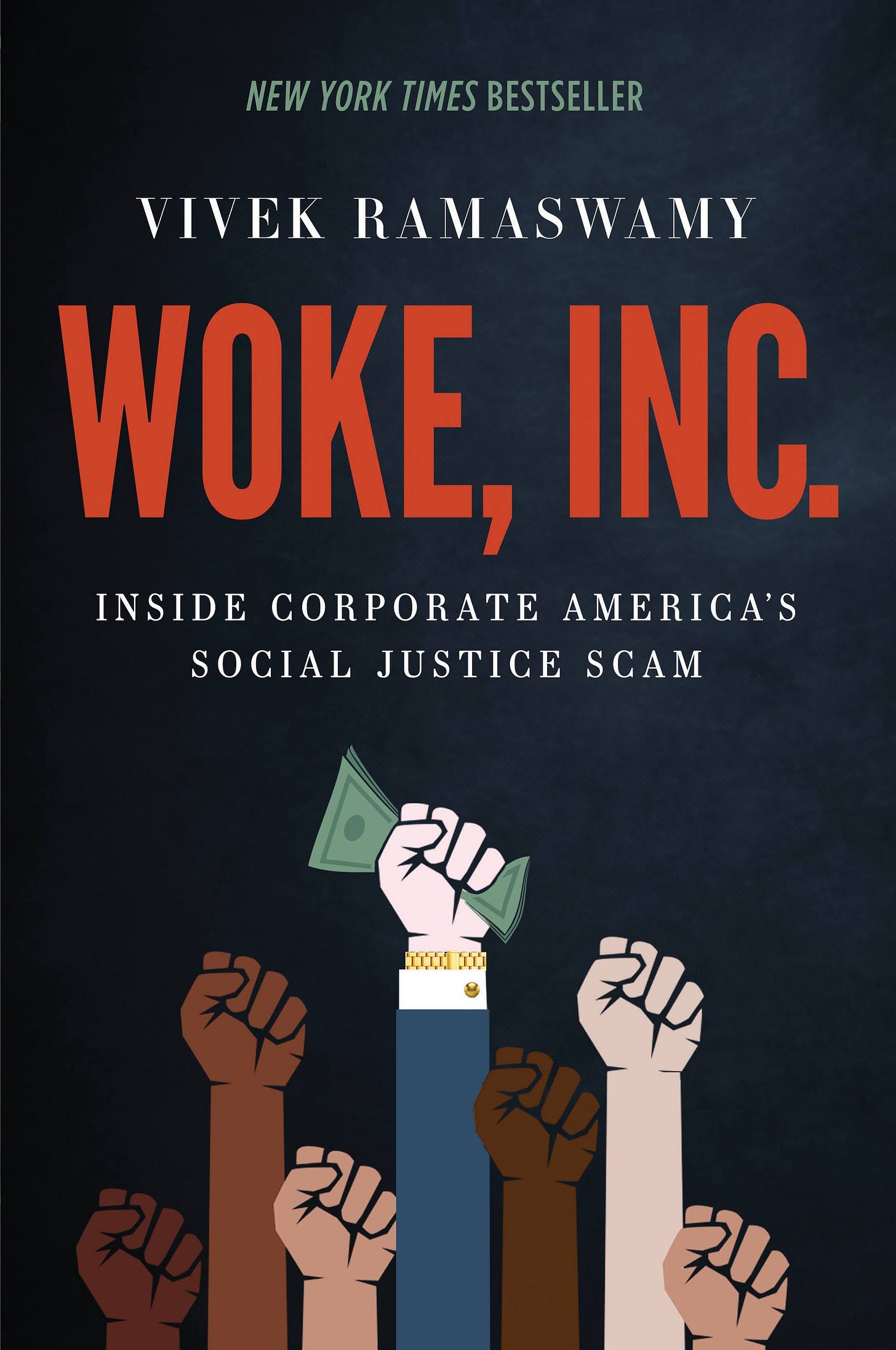E-Pluribus | December 22, 2021
A race to the bottom, more on Woke Capitalism, and why Americanism is the bestt way to fix what's still wrong with America.
A round up of the latest and best writing and musings on the rise of illiberalism in the public discourse:
Jacob Mchangama: A Race to the Bottom on Internet Censorship
While the rise of authoritarian states such as China is worrisome enough, their censorious tendencies are to be expected. As Jacob Mchangama writes at Persuasion, the actions of the governments in the free world are more disappointing when they do the work of authoritarian states for them.
One way to blur the lines between illegal and harmful content is to expand the definition of the former to include more of the latter. The Joint Committee appointed by Parliament to consider the safety bill, along with the U.K. Law Commission’s latest project on reforming communication offenses, are now pushing for criminal sanctions for posting misinformation and to broaden the ambit of illegal harm to include other categories of speech such as “misogynistic communications.” In addition, the Law Commission proposed criminalizing the spread of “false communications” intended to cause non-trivial emotional, psychological or physical harm. The Joint Committee, in its December 2021 report released last week, endorsed this idea. Accordingly, these 21st century proposals now include language mirroring an English law from 1275 that criminalized the distribution of “any false News or Tales” sowing “discord” between the King and his people. This is hardly a sign of progress.
Even worse, the criminalization of “fake news” mirrors developments in authoritarian states where Covid-19 has given rise to a censorship pandemic, in which governments in an increasing number of countries including Zimbabwe, Cambodia, Turkey, and Egypt have used the very real threat from Covid-19 to adopt and justify emergency laws against false information drafted or interpreted so broadly as to target information and opinions deemed undesirable by the government more broadly.
This development threatens the most vulnerable and persecuted voices who most need social media to circumvent censorship and government propaganda. When Twitter suspended President Donald Trump’s account, the currently imprisoned Russian opposition leader Alexey Navalny noted that “this precedent will be exploited by the enemies of freedom of speech around the world. In Russia as well. Every time when they need to silence someone, they will say: ‘this is just common practice, even Trump got blocked on Twitter.’” Likewise, the Pakistani digital rights activist Nighat Dad recently noted that “some of the regulations in the Global South are copy-pasted from the Global North” and that “what is proposed in the Global North can damage communities in our part of the world.”
Read it all here.
Brian Knight: The Dangers of Woke Capitalism
Brian Knight reviews Vivek Ramaswamy’s book Woke, Inc.: Inside Corporate America’s Social Justice Scam for Discourse Magazine. While generally approving of the book, Knight raises some concerns about the use of legislation to try to rein in corporations and their sometimes intrusive social agendas while acknowledging that the courts do play a legitimate role in applying civil rights laws.
Critics of Ramaswamy, such as Richard Hanania, argue that trying to use civil rights law will empower woke bureaucracies such as the Equal Employment Opportunity Commission and HR departments. In Hanania’s telling, civil rights law and subsequent court rulings forced corporations to hire compliance bureaucracies in the form of HR departments. These bureaucracies evolved into enforcers of wokeness, and any effort to use civil rights law will simply empower them (as well as trial lawyers) further. While Hanania acknowledges that there may be some benefit to making political belief a protected class (it did allow James Damore to sue Google and get a settlement) and could be “tolerable” if there were a plan to get more conservatives into civil rights enforcement, he doubts that will happen. Instead of trying to cast out demons by Beelzebub, Hanania argues the non-woke should focus on rolling back civil rights law.
This critique is ironic because it acknowledges that civil rights law (or an equivalent) could itself be used to counter the most pernicious problems of woke capitalism. In Hanania’s own theory, the law forced changes to companies that in turn changed culture, causing a feedback loop. Why couldn’t that continue to work? If what corporations (or their shareholders) want most is to be profitable and not get sued, they have an incentive to comply with a new law. Yes, compliance will be imperfect, especially initially, but with an enforcement mechanism in place, HR departments will have an incentive to evolve to protect the company (and their own jobs).
[…]
[W]e should acknowledge that laws that carry the possibility of (sometimes significant) damages can create their own market for enforcement. Hanania worries that making politics a protected class will empower trial lawyers, but if you want the law to be enforced, you want trial lawyers on the prowl. They may not be motivated by a commitment to free speech or resisting private political coercion, but their motives do not need to be pure. To paraphrase Adam Smith, “It is not from the benevolence of the trial lawyer that we expect our rights to be vindicated, but from their regard for their own ability to buy a mansion and not have to fly commercial.”
Read the whole thing.
ICYMI: Wenyuan Wu: Winning the Culture War with Americanism, Not Racial Marxism
In November on the Minding The Campus website, Wenyuan Wu of Californians for Equal Rights Foundation warned about the dangers of “Racial Marxism” — the idea that the injustices of the past can and should be redressed by different injustices in the present. While imperfect in founding and execution, the principles of America and Americanism are a far better bet to create a more just society than borrowing from what are ultimately repressive ideologies.
The adherents of Racial Marxism, a growing majority of American academics, are “religious” zealots, not reformers. Their radical orientation is both substantive and methodological. Arbitrary group grievances take over constructive understanding of historical and cultural nuances at the center of policy deliberations. In order to overthrow the Western or American system that is allegedly irredeemably racist, all actors and processes must atone for the unforgivable sin of racism through a radical embrace of anti-racism, racial equity, social justice, and the like. Past injustices are “corrected” by present injustices in the name of equity—a rather Marxist concept.
Aside from philosophical and moral arguments against this new ideology, a common rebuttal to Racial Marxism is that it simply does not work. Collectivist social engineering failed disastrously in socialist China, the former Soviet Union, Castro’s Cuba, Venezuela under the Fifth Republic, and, arguably, North Korea. Third International was more of a historic relic than a practical regime blueprint. Unprecedented international economic growth and integration have only been achieved after the end of the Cold War, when former socialist economies joined the global market. Even Vladimir Putin is warning the West against the dogmatic adoption of Bolshevik values through cancel culture, anti-racism, group think, and racial spoils.
This is not to water down or dismiss the negative consequences of economic openness, such as inequality, job insecurity, capital flight, and cultural homogenization. But none of those challenges can be solved through a simplistic opposition to Racial Marxism. Rather, we ought to pursue a reiterative process of policy reforms that mitigate social harms without damaging the host society. In other words, one would be a fool to believe that endless diversity trainings can spur innovation in our colleges and universities, or that dumbing down K-12 standards in pursuit of “racial equity” and “restorative justice” will increase our global competitiveness. According to the American formula of public-private partnerships prescribed by Friedman and Mandelbaum, we instead need to provide quality public education to the next generation, continue attracting global talent to enrich our cultural and economic life, modernize American infrastructure, support basic research and development, and implement sound government regulations to address market externalities. All of these proposals require unity among Americans who have been polarized on the wrong issues. We need a common belief in the American Dream: “The American dream is the glue that has held together a diverse, highly competitive, and often fractious society.”
Read it all.
Around Twitter
Via Heterodox Academy, a thread of Jon Haidt on what college should be - “a time for learning”:
Author Abigail Shrier on what it takes to face down untruths (via Grant Callen, Adam Rubenstein and Bari Weiss):
Finally, via Peter Boghossian, a two-part explanation from Dr. Bruce Gilley on “decolonization”:











